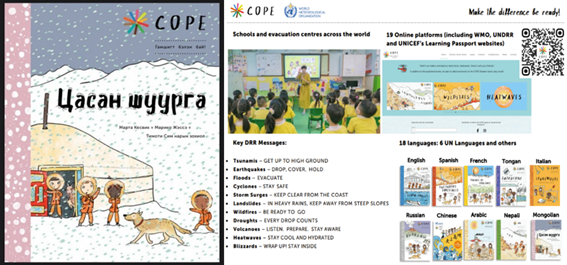Multilingualism and Diversity at WMO – Bringing the Secretariat Closer to Members and Regions
- Author(s):
- Maja Carrieri and Johannes Kratzheller, WMO Secretariat

The widely diverse staff at WMO hail from about 90 countries. They enrich the working environment by bringing a vast array of cultures and languages into the Organization, which contribute to WMO’s ability to serve Members worldwide. The understanding of issues and opportunities on-the-ground stems partly from the common shared experiences of WMO staff and its constituents and beneficiaries. Further enhancement of diversity, multilingualism and openness at WMO is key to its continued success.
Multilingualism
United Nations Secretary-General António Guterres emphasized that “multilingualism helps guarantee the effectiveness of our multilateral system”. This is true across the United Nations, and especially so in the life-saving work facilitated by WMO and its partners. Coordination of global cooperation in meteorology, climatology, hydrology and other related environmental fields, as per the WMO mandate, requires multilingualism. At WMO, the exchange of observational data, the provision of expert training, the delivery of weather forecasts and alerts and the calls for action on the state of the climate require listening and communicating with diverse audiences in languages they understand. Multilingualism is key to reaching and connecting with those audiences.
The Organization communicates effectively with its diverse membership in the six official languages of the United Nations system, fostering trust, engagement and solidarity across linguistic borders. The more Members feel heard and valued, the stronger and more productive the relationships between them and with the Organization.
WMO has been investing in multilingualism over the years. Teams of linguists around the world work hand-in-hand with Secretariat professionals behind the scenes to enable experts in meteorology, climatology, hydrology and environmental sciences to understand each other and to be understood by the public and stakeholders.
Each of the 193 WMO Member States and Territories selects one of the six official languages – Arabic, Chinese, English, French, Russian and Spanish – as their preferred language for official correspondence. Translation and interpretation are provided in these languages at all WMO constituent body meetings. By ensuring that all communication, including important documents, are available in the official languages, the WMO demonstrates commitment to inclusivity and respect for linguistic diversity.
Furthermore, multilingualism enhances the Organization's outreach efforts by ensuring that critical information reaches stakeholders in a language they understand. WMO’s meticulous translation of relevant constituent body documentation and publications, training materials and policy documents maximizes their impact and facilitates broader uptake by National Meteorological and Hydrological Services (NMHSs), stakeholders and the public. Most of these are available through the revamped WMO e-Library, launched in 2023.The e-Library provides unlimited access to digital publications on meteorology, climatology, hydrology, and related fields. It has a six-language interface, offers advanced search and the filtering of possibilities for ease of research in publications that go as far back as the time of the International Meteorological Organization.
WMO pushes this effort beyond the prescribed United Nations scope of languages by supporting translation of public outreach materials in many more languages. For example, “We care for our climate” was published in the six official United Nations languages, but also Croatian, Dutch, Finnish, Greek, Papiamento, Persian, Turkish, etc., in cooperation with NMHSs. A recently published children’s book series that uses simple terms to explain what to do in case of natural hazards such as floods, earthquakes and landslides was also published in several languages (see Figure 1). Several videos have also been adapted to local cultural contexts and language (see Figure 2).

Diversity and inclusion into the future
WMO plays a lead role in the United Nations Early Warnings for All initiative, shoring up gaps in Earth observations, data sharing and processing, and by providing staff capacity development to NMHSs to ensure that everyone everywhere has access to Multi-hazard Early Warning Systems (MHEWS). When danger looms, people at risk must receive timely early warnings in a language or dialect that they understand. The most vulnerable are children, women, older people and those with disabilities, who often do not receive warnings or do not understand the warnings received. WMO must take advantage of every opportunity to improve capacity warning services so that no one is left behind. Two immediate tools at hand are staff recruitment and proactive harnessing of new technologies, such as artificial intelligence (AI).
When it comes to recruitment, diversity and inclusion have a true meaning in the WMO context. The development and promotion of meaningful, timely weather, climate and water-related information services should also aim to secure equal treatment to all and for all, which goes far beyond communication in official languages. The WMO Secretariat promotes such an approach through recruitment that places an emphasis on diversity of staff and consultants, gender-wise and language-wise.
Just a few years back, the use of technologies for early warnings might have seemed like science-fiction, but emerging and developing language technologies have brought it into the realm of possibility. It is by remaining at the forefront of the latest technological developments in the field of languages that WMO has continued to deliver an increasing number of translations every year. Today, speech-to-text programs and captioning are commonplace. The WMO Secretariat moved from “English only” information documents to multilingual documents thanks to computer-assisted and machine translation tools.
This new paradigm opens the door for future solutions that can overcome language barriers, far beyond the official languages. Large language models can be trained for WMO terminology and the benefits of AI can already be observed in some areas. Linguists are the custodians of translation quality who will harness AI to the benefit of multilingualism in the WMO community of experts and users.


